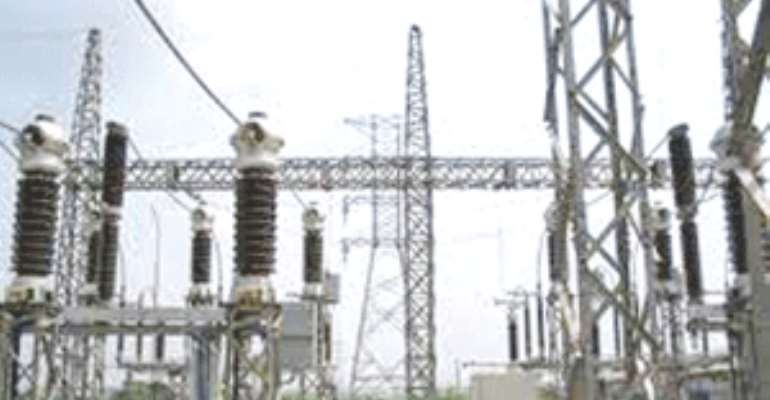EFFECTIVE POWER SUPPLY AND MEETING SET TARGETS

By KUNLE KALEJAYE
Nigeria is in dire need of Infrastructure renewal, upgrading, modernisation and expansion. Of all the infrastructural facilities in need of radical development, electricity stands out. The quantum of power consumed in a country by the citizens is considered a good indicator of the country's socio-economic performance.'
These were the sentiments expressed by the Minster of Power, Prof. Bart Nnaji, at a forum in Lagos. Beautiful speech you may want to say, but the reality remains that about 250 containers containing valuable PHCN equipment have been abandoned at the Lagos port for the past five years.
These electricity materials were imported to boost power generation in the country. While 140 of the containers were abandoned at the Ports and Cargo Terminal, Tin Can Port, Lagos, the remaining 110 were reportedly moved to the Ikorodu Customs Port and left to rot away, as they had remained there for over three years without any PHCN official coming forward to clear them.
Experts in the power sector are of the opinion that if the 250 containers that were imported by National Integrated Power Plants, NIPP, were properly utilised in the sector, companies like Dunlop, Michelin, and other textile industries would not have winded-up and relocated to neighboring country like Ghana.
The experts noted that Brazil, a developing nation of some 200 million people, generates about 100,000MW, while Nigeria, a country of 167 million, produced a mere 4,400MW, adding that in view of this disparity, Nigeria had no reason to pride itself as a giant of Africa.
Besides, they noted, PHCN has also lost some of its major customers like Nigeria Breweries, Nestle, Guinness, and major hotels, who now generate their own electricity, which automatically translates to a huge loss of revenue for the power sector.
Three months after the Nigerian Customs Services, NCS, raised the alarm, its Comptroller General, Mr. Dikko Abdullahi, in a February 20, 2012 publication, appealed to government agencies to come for their abandoned containers.
Dikko said as part of the efforts to decongest the Lagos seaport, a special presidential committee for the exercise has been working to transfer overtime and abandoned containers to the government warehouse at Ikorodu.
It is believed that some 4,000 containers were scheduled to be transferred out of the port by the committee in the first phase of the exercise. So far, 1,616 containers have been moved to Ikorodu warehouse.
Geregu Power Plant
The Customs boss via the advertorial appealed to importers of the abandoned containers to take urgent steps to clear their containers. Among the containers transferred were 227 containers that belong to the NIPPP.
Less than a fourth night after the NCS's appeal, the legislators accused the NIPPs of frustrating Federal Government's effort to boost power generation in the country through lack of supervision and monitoring.
The Chairman, National Assembly Joint Committee on Power, Senator Philip Aduda, summoned the Minister of Power and the management of the NIPP over allegations of contract change.
Aduda alleged that those saddled with the responsibilities of managing the power projects worth over $5.4billion were quacks, saying, 'When square pegs are not put in square holes, when you, as the head is not an engineer, then there are bound to be troubles. I am surprised that you were busy taking stock and making payment rather than supervising the projects.
'You have not visited a site of the contracts you awarded six years ago. We wanted Nigerians to see what we are into and people who are hindering us.'
Aduda, who was visibly angry, described the Managing Director of the Niger Delta Power Holding Company of Nigeria, the executors of the NIPPs, Mr. James Olotu, as an arm-chair executive, who is not supposed to manage the power projects.
Aduda was displeased by the attempt by NIPP to scuttle the Ikot Ekpene Power project, which was awarded to Cartlark International Limited for N6.8billion, as the contract was terminated without even visiting the site to ascertain the extent of work done since 2006 when it was awarded to Cartlark.
In view of such indifference to set targets, observers fear that that it may not be feasible for the federal government to realize future electricity targets for the country.
Specifically, the minister of power has reiterated that for Nigeria to produce, transmit and distribute 40,000MW by 2020, as targeted, it will require an investment of up to $1trillion (N160trillion), with generation accounting for 35 per cent of the sum.
He, however, admitted that such a huge capital outlay is currently not available, as government is faced with several competing needs in agriculture, education, health, adding that such an amount can only be sourced through the international capital market.
These issues continue to raise more questions than answers, and would remain the bane of power sector development, except drastic measures are taken to address them frontally.
